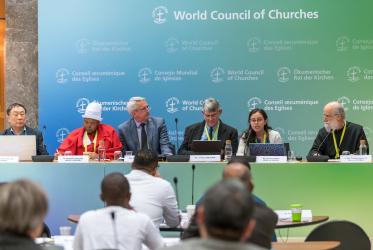15 August 2006
Download the full text as pdf file (351 KB)
EXECUTIVE SUMMARY
The AIDS pandemic has taken a tremendous toll on people worldwide and has reached critical proportions. An estimated 4.9 million people were newly infected with HIV in 2005, and more than 41 million people are currently living with HIV. More than 25 million people have died of AIDS over two decades. Recognizing the sheer size and gravity of the AIDS crisis, 189 member states of the United Nations at the twenty-sixth United Nations General Assembly Special Session (UNGASS) in 2001 unanimously adopted and signed a "Declaration of Commitment" an epic international pledge to substantially increase both resources and attention to fighting HIV/AIDS.
Churches and Faith Based Organizations (FBO) around the world facilitated by the World Council of Churches (WCC) also made commitments to join the fight against HIV/AIDS in line with the UNGASS DoC by putting forward their resources and collaborating with governments and non government associations. The moral and spiritual influence of religious leaders in all communities was offered, to decrease the level of stigma and discrimination, vulnerability of people for responding to HIV/AIDS and to contribute to the highest level of care and support that is attainable. Over the last five years, there has been a tremendous spurt in the faith community's engagement with HIV at a visible level and numerous efforts have been made to address the problem. The list of promises made, both as countries at the international level and as faith communities, is a long one. This survey addresses the question: "Are we keeping our promises?"
The Health and Healing Program of the World Council of Churches commissioned this study to identify, measure and analyze the level of commitment of Faith Based Organizations in combating HIV and AIDS and also to scrutinize the steps taken by Faith Based Organizations in keeping the promises they made. A questionnaire was designed and developed by the WCC in collaboration with UNAIDS, World Health Organization and the Ecumenical Advocacy Alliance and was based on the main indicators of leadership, public mobilization, prevention, treatment and care outlined in the UNGASS DoC. Stakeholders for the study were identified ranging from church leaders, lay people and people living with or affected by HIV or AIDS.
The first phase of the study was conducted at the WCC's Ninth Assembly in Porto Alegre, 14-23 February, where questionnaires were distributed to church leaders to evaluate and and AIDS. This was followed by an online survey of a sample of other stakeholders for feedback on the role played by their FBOs and leaders in the fight against HIV and AIDS, the attitudes of members towards people living with HIV, and the services available for people living with or affected by HIV or AIDS.
Two hundred and ninety four (294) respondents from FBOs representing eighty-eight (88) countries responded to the survey. Thirty-two percent (32%)of the respondents were from Africa. Sixty (60) respondents identified themselves as National religious leaders, 22 identified as regional religious leaders,62 identified as ordained members and 67 identified themselves as lay members.
The findings are expected to play a major role in shaping a systematic, efficient and effective strategy for Christian FBOs to more successfully handle the HIV/AIDS crisis. The study will encourage Christian FBOs by recognizing their excellent work and, hopefully, also bring in a measure of accountability and galvanize, energize and mobilize inactive Christian FBOs to start taking active steps to keep their promises.




